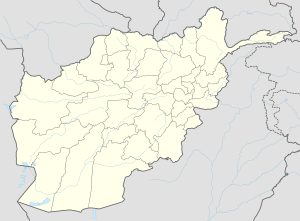Lejay | |
|---|---|
 Lejay, and some major cities of Afghanistan. | |
| Coordinates: 33°09′N 65°08′E / 33.150°N 65.133°E | |
| Country | |
| Province | Helmand Province |
| Time zone | UTC+4:30 |
Lejay, Afghanistan is a small village in Helmand Province.
Taliban ambush
[edit]Taliban forces in this village executed an ambush on a U.S. Special Forces Reconnaissance element, consisting of seven Green Beret detachments (A-Teams), on February 10, 2003. The subsequent battle, initiated by the ambush, lasted for 43 hours. During this engagement, a multitude of munitions were dropped by CAS (Close Air Support) ranging from 500 lbs to 2000 lbs. Several of the Green Berets received shrapnel and grazing wounds, but none were evacuated from the area. At least 43 Taliban insurgents were killed during the engagement.
The Americans rounded up dozens of prisoners following the battle.[1][2] By one account, the Americans rounded up 70 Afghans. Another account said they rounded up 40 Afghans. According to the evidence produced at the Combatant Status Review Tribunals, some of the prisoners were sent to the Guantanamo Bay detainment camp, in Cuba.
Press reports of the military action in the neighborhood of Lejay
[edit]Coalition forces conducted an aerial campaign against the neighborhood of Lejay.[3] Haji Pir Mohammad, the deputy governor of Helmand, led a six-man investigative team to the region, to investigate villager's reports of a massive American aerial bombardment.[4] [5]
Colonel Roger King, a US military spokesman, told reporters that the US Special Forces hunting the ambushers believed they were hunting between thirty and one hundred fighters. He informed reporters that American troops had found ammunition casings and empty rocket tubes. He called the reports of civilian casualties "unsupported". He stated that the US aerial bombardment had been confined to caves, and the ridgeline east and west of Lejay.
Press reports of the scale of the bombardment King reported were inconsistent.
- On February 12, 2003, the New York Times quoted King as acknowledging coalition forces dropping almost 20 2,000 pound bombs.[6]
- On February 12, 2003, the Sydney Morning Herald quoted King acknowledging "Close air support was requested, and coalition F-16s dropped five 500-pound bombs."[7]
- On February 13, 2003, Reuters quoted King acknowledging that the US had dropped a single 2,000 pound bomb, and fired ten 105mm cannon rounds from an AC130 aerial gunship.[4]
- On February 13, 2003, The Guardian reported that the region had been subjected to an eight-hour bombardment, from a mixed force of B1 and B52 bombers.[8]
- On February 14, 2003, the BBC quoted King acknowledging that the coalition had dropped four 500 pound bombs.[9]
Lejay villagers taken to Guantanamo
[edit]| ID | Name | Notes | |
|---|---|---|---|
| 966 | Baridad |
| |
| 963 | Abdul Bagi | ||
| 964 | Rahmatullah | . | |
| 972 | Alif Mohammed | . |
See also
[edit]References
[edit]- ^ a b Summarized transcripts (.pdf), from Abdul Bagi's Combatant Status Review Tribunal - pages 1-12
- ^ Summarized transcript (.pdf), from Rahmatullah's Administrative Review Board hearing - page 49
- ^ "U.S. bombers pound Afghan caves". CNN. February 13, 2003. Archived from the original on 2007-02-03. Retrieved 2007-03-16.
- ^ a b Mirwais Afghan (February 13, 2003). "Afghans Say More Civilians Die in U.S.-Led Raids". Reuters. Retrieved 2007-03-16.
- ^ Mirwais Afghan (February 13, 2003). "Afghans Say More Civilians Die in U.S.-Led Raids". Reuters. Retrieved 2007-03-16.
- ^ Gall, Carlotta (February 12, 2003). "Afghans Report 17 Civilian Deaths in U.S.-Led Bombing". The New York Times. Archived from the original on March 4, 2016. Retrieved 2007-03-16.
- ^ "Coalition warplanes bomb Afghan caves after ambush". Sydney Morning Herald. February 12, 2003. Retrieved 2007-03-17.
- ^ Rory McCarthy (February 13, 2003). "17 Afghan villagers 'killed in American bombing raids'". London: The Guardian. Retrieved 2007-03-16.
- ^ "Coalition forces step up Afghan raids". BBC. February 14, 2003. Retrieved 2007-03-16.
- ^ Abdul Waheed Wafa, Freed From Guantánamo Bay, 7 Afghans Arrive in Kabul, New York Times, December 17, 2006
- ^ Abdul Waheed Wafa, 7 Afghans free after 5 years at Guantánamo, International Herald Tribune, December 17, 2006
- ^ Seven home from Guantanamo, Taipei Times, December 17, 2006

